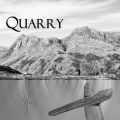In Universes, by Emet North
These were my comments on In Universes, by Emet North, another book passed on to me by our local bookseller.
...
This was undeniably a strange book. I haven't read much queer fiction which was so overtly queer as this, and I kept feeling that it was full of coded messages that I was just missing.
On the plus side, the writing style was engaging and fluid, and kept me going through stages where the actual content of the prose was discouraging.
However, the content was very unfocused, IMHO - and bearing in mind that I might well have simply missed a lot of sub-surface stuff. It began with a kind of nod to many-worlds quantum theory - as so many people do these days - but this only served to introduce the idea that each chapter was sort-of a different universe in which different things had happened and where people, especially the protagonist, had made different choices.
Successive chapters then dealt with broadly the same assemblage of characters, but in different permutations. In some, a major character had died young, but in others not. In some, the relative ages of characters were mixed up. In one, all mothers (and a few other women) had fissioned into swarms of creatures. In another, aliens had arrived and were using animal bodies to kill people. I could see that some were intended metaphorically rather than factual, but others seemed to ask to be taken literally.
The closing chapters form - rather unexpectedly - a kind of Jewish apologetic, with Maimonides picked out as showing a route to forgiveness, and a focus on the biblical Cities of Refuge as a haven... again perhaps a metaphor for a caring social group within the wider world, rather than specific locations. Judaism lurks in the background of the earlier sections, but I hadn't anticipated it becoming such a strong feature at the end.
Every so often the many-worlds theme resurfaces, but (I think) as a plot device to signal a change of environment, rather than in a sciency way. The main thing that struck me about this was how, once you were past the surface trappings of swarms or aliens or bears or ghosts, how alike the worlds were. The impression I was left with was that Emet North reckons that whatever quantum choices might do to the universe, then character and queerness remain as constants. And the worlds are fairly uniformly bleak - in almost all of them the protagonist has strong inclinations towards suicide, and I don't think they were happy in any of them.
About half way through the protagonist changes pronoun from "she" to "they", but it wasn't clear to me whether this represented an objective change, or an acceptance of self, or a choice, or simply the result of being in a different universe. I think the author simply wanted you to clock the change and make of it what you will - at least, I didn't see any exposition of this switch. The other striking thing (to me at least) was that the biography of the author as given at the end of the book coincides to a remarkable degree with the sequence of events and employment choices of the protagonist. Are we supposed to read the book as autobiography along with the other aspects?
In short, a very nicely written book as regards the style, but perplexing as regards the content, unless you're privy to the coded messages contained therein. It wouldn't draw me to read other books by the author, and I think you'd have to be already committed to queer fiction to pick the book up on spec.

 Help offset server costs by donating. This is totally optional. Any overages will go to library fines or new books.
Help offset server costs by donating. This is totally optional. Any overages will go to library fines or new books.

Comments
@Apocryphal said:
I thought the coded emoji bit was one of the most interesting side-plots of the series! I don't know enough about filming to be struck by the much-hyped single-shot camera technique, and I found some of the story-telling quite erratic (eg they totally dropped some plot lines and some characters) but I thought that was a striking illustration of the very issue you are highlighting here
> This inability to communicate (aphasia) becoming a social problem would make a great theme for a highly relevant SF novel.
I think _Blindsight_ does this. I'm that book, a team of disparate experts investigate some Big Dumb Object. But the different experts have such wildly different vocabularies and world views that they can't communicate directly. One of the crew (the book's narrator) is brought along specifically to translate between them so they can communicate.
@BarnerCobblewood if you would like to do this I can slot you in at whatever month is best for you?
> @NeilNjae Is interesting you mention this. I was thinking it might be a good book for us to read here.
I read this not too long ago - I’d be willing to give it a re-read.